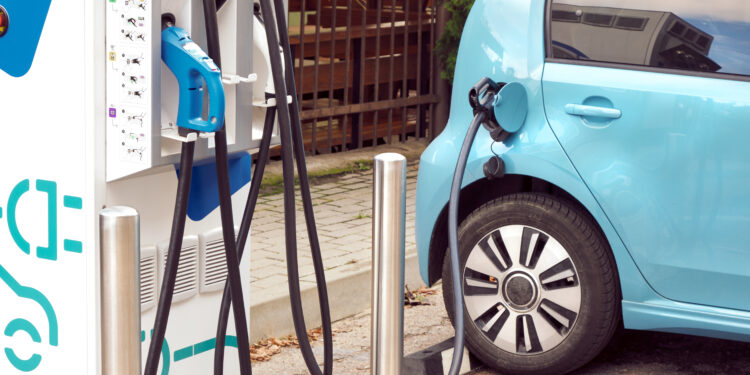Lucid Group Inc. (NASDAQ:LCID) is an American electric vehicle manufacturer that has captured global attention with its ambitious mission to redefine luxury mobility through innovation, technology, and sustainability. Headquartered in Newark, California, the company was founded in 2007 under the name Atieva, originally focusing on electric vehicle battery systems and powertrains before rebranding to Lucid Motors in 2016. With its pivot to producing luxury electric cars, Lucid has become known for combining cutting-edge engineering with a focus on design excellence and efficiency, positioning itself as a serious competitor in the premium EV market.
The company’s flagship model, the Lucid Air, was first unveiled in 2020 and immediately drew industry acclaim for its record-breaking range, advanced aerodynamics, and ultra-fast charging capabilities. Built on the proprietary Lucid Electric Advanced Platform (LEAP), the Air showcased the company’s strength in developing efficient drivetrains and high-density battery systems. Production of the Lucid Air began in 2021 at the company’s Casa Grande, Arizona facility, which was designed as a purpose-built EV manufacturing hub. The Air has since won multiple awards, including recognition from MotorTrend as the 2022 Car of the Year, cementing Lucid’s status as a formidable challenger to established automakers like Tesla, Mercedes-Benz, and BMW in the luxury electric space.
Beyond its flagship sedan, Lucid has continued to broaden its ambitions with the introduction of the Lucid Gravity SUV, unveiled in late 2023 and set to enter production in 2024. The Gravity is designed to bring Lucid’s technology and luxury appeal into the high-demand SUV segment, with promises of best-in-class range, performance, and versatility. Alongside its consumer vehicles, the company has also entered strategic partnerships, including technology supply deals such as providing advanced electric powertrain systems to Aston Martin, highlighting Lucid’s reputation as an industry innovator in EV technology.
A key factor in Lucid’s development has been its strong financial backing, particularly from Saudi Arabia’s Public Investment Fund (PIF), which remains its largest shareholder. This sovereign wealth fund has not only injected billions of dollars into Lucid but has also supported the company’s plans for international expansion, including a major manufacturing facility in Saudi Arabia. This global presence reflects Lucid’s goal of being more than just a niche luxury EV maker—it aims to be a leading global player in the electric mobility revolution.
Lucid’s growth story, however, is not without challenges. The company continues to navigate a highly competitive EV landscape, where scaling production, controlling costs, and achieving sustainable profitability remain pressing hurdles. Despite these challenges, Lucid has earned recognition for its industry-leading battery efficiency, aerodynamic design, and luxury experience. Its vehicles continue to attract attention not only for their performance but also for their forward-looking vision of a cleaner, electrified future.
By combining bold design, advanced engineering, and strong financial backing, Lucid Group Inc. has established itself as a company with both significant potential and complex challenges. As it pushes forward with its product roadmap and global expansion plans, the company stands at a pivotal point in its journey to becoming one of the defining names in the electric vehicle industry.
Lucid Group Hits 52-Week Low as Profitability Woes and Investor Skepticism Deepen
Lucid Group Inc. continues to face significant headwinds that make a bearish outlook increasingly difficult to ignore. Despite its technological promise and strong financial backing from the Saudi Public Investment Fund, the company’s recent performance highlights deeper concerns around profitability, scaling, and investor confidence. The electric vehicle manufacturer’s stock reached a fresh 52-week low of $18.54, underscoring both operational challenges and broader sector weakness. This decline places Lucid in the spotlight of risk-averse investors who are increasingly skeptical of its long-term viability.

CHECK THIS OUT: How Globalstar (GSAT)’s Strategic Apple Partnership is Changing the Satellite Game and Intel (INTC)’s Epic Comeback: Why Wall Street May Be Dead Wrong About This “Dying” Chip Giant.
Stock at a 52-Week Low and Market Sentiment Weakness
Lucid’s stock trading at $18.54 represents not just a 52-week low but also a symbolic marker of diminished investor confidence. Over the past year, shares have plunged by 48.17%, reflecting a combination of weak execution, competitive threats, and macroeconomic uncertainty in the electric vehicle sector. According to InvestingPro, technical indicators now classify the stock as being in oversold territory, but this has not yet translated into meaningful buying momentum. The company’s market capitalization has shrunk to just $6.08 billion, a sharp comedown from the hype surrounding its early post-SPAC days when it was touted as a credible Tesla challenger.
Growth Without Profits: The Achilles’ Heel
Lucid has posted 39% revenue growth in the last twelve months, which might appear impressive on the surface. However, the real story lies beneath: the company continues to struggle with negative gross margins, meaning it loses money on every car it delivers. This inability to generate sustainable profitability makes growth effectively meaningless in the short term. Investors are increasingly wary of companies that chase volume at the expense of margins, especially in a high-interest-rate environment where cheap financing is no longer guaranteed.
Cash Burn vs. Liquidity Cushion
Lucid maintains a healthy current ratio of 2.58, signaling that short-term liquidity is not an immediate problem. Yet, the company’s rapid cash burn rate casts doubt on how long it can sustain operations without further diluting shareholders or seeking additional sovereign backing. Analysts warn that liquidity may only last through mid-2026, putting enormous pressure on Lucid to deliver profitable vehicles at scale within a very narrow window. Without this, its once-promising liquidity cushion could evaporate, leaving investors exposed to dilution risk.
Reverse Stock Split: A Red Flag for Investors
In August 2025, Lucid executed a 1-for-10 reverse stock split, cutting its outstanding shares from roughly 3.07 billion to 307.3 million and reducing its authorized shares from 15 billion to 1.5 billion. While the company framed this as a strategic move to stabilize its stock price and ensure compliance with Nasdaq listing requirements, reverse splits often serve as red flags. They may provide temporary cosmetic relief but rarely solve underlying structural problems. The split underscores the company’s struggles to maintain institutional investor confidence.
Analyst Downgrades and Price Target Cuts
Adding to the bearish sentiment, Stifel recently slashed its price target from $3.00 to $2.10, maintaining only a Hold rating. This downgrade came after Lucid’s second-quarter earnings, where revenue slightly beat expectations but both gross profit and adjusted EBITDA fell short. Analysts have expressed concern that even modest revenue growth cannot offset the company’s mounting operating costs. With Wall Street consensus already skeptical, Lucid faces an uphill battle to regain credibility in the eyes of institutional investors.
Challenges with Scaling Production
Lucid has touted the Gravity SUV as its breakthrough product, but scaling production has proven to be far more complex than expected. Even as Lucid showcases concept vehicles and demonstration drives at high-profile events like Monterey Car Week, analysts point out that showmanship cannot disguise operational struggles. The gap between concept hype and production reality continues to weigh heavily on Lucid’s outlook, making it difficult to justify current valuations.
Competitive and Regulatory Pressures
Lucid’s luxury positioning puts it in direct competition with Tesla, Mercedes-Benz, BMW, and other well-capitalized incumbents who already dominate the premium EV market. At the same time, regulatory changes—particularly the potential reduction or elimination of federal and state EV credits—threaten to erode one of Lucid’s most lucrative revenue streams. Analysts estimate that losing these credits could strip as much as $200 million annually from its top line, removing a key buffer that has historically supported financial performance.
Final Thoughts: Why Bears Still Dominate
Lucid’s story remains one of promise overshadowed by execution risk. The company boasts cutting-edge EV technology, bold partnerships, and sovereign backing. Yet, the reality of collapsing share prices, negative margins, persistent cash burn, and cautious analyst sentiment presents a formidable wall of skepticism. While some investors may view current prices as an attractive entry point given oversold technicals, the bearish thesis is reinforced by structural weaknesses that will take years—not quarters—to resolve.
Until Lucid can prove its ability to deliver profitability, scale production efficiently, and regain investor trust, the risk-reward profile appears firmly tilted to the downside.
READ ALSO: POET Technologies (POET) Delivers 1.6T Optical Innovation—Is a Massive Revenue Surge Next? and BigBear.ai (BBAI) is Flying Under the Radar—But Not for Long. Here’s Why Bulls Are Piling In.






